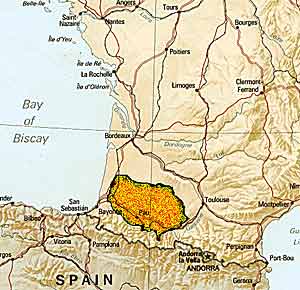The Exotic Wines of Jurancon
Beth Ribblett
 Our upcoming wine dinner with Café Degas that will feature the wines and food of southern France gave me a wonderful opportunity to write about a little known wine region on the slopes of the Pyrenees, Jurancon. The dinner is also giving me a chance to introduce a Jurancon wine to our adventurous participants as we will pair it with the Skate Grenoblois fish course.
Our upcoming wine dinner with Café Degas that will feature the wines and food of southern France gave me a wonderful opportunity to write about a little known wine region on the slopes of the Pyrenees, Jurancon. The dinner is also giving me a chance to introduce a Jurancon wine to our adventurous participants as we will pair it with the Skate Grenoblois fish course.Jurancon is is a small, relatively unknown area located in southwest France. With terraced vineyards facing the steep slopes of Pyrenees at an elevation of 1000 feet, it is located between Lourdes and Biarritz, and produces some of the most exotic white wines I’ve ever tasted.
Historically, Jurançon was the very first region to introduce the concept of the “crus” in the 15th century as a protective measure to preserve the authenticity of the wines. Also in 1553, when Henri IV-the future "Henry the Great"-was born Jurançon wine
 became a part of French history: when the royal infant was christened, his lips were rubbed with a clove of garlic and moistened with a drop of Jurançon wine from which he derived “a vigour and an ardent spirit which were never to leave him”.
became a part of French history: when the royal infant was christened, his lips were rubbed with a clove of garlic and moistened with a drop of Jurançon wine from which he derived “a vigour and an ardent spirit which were never to leave him”.Most of the grapes grown in the region are either Gros Manseng, Petit Manseng, or Courbu, with a little Camaralet de Lasseube and Lauzet thrown in for good measure. Never heard of these varietals? You're not alone. They haven't ventured much out of their region of origin in the Basque region since they were first planted. Manseng is planted in a scant 2500 acres in all of France, most of it centered around the town of Jurancon and Gascon. Courbu (also known as Petite Courbu) is so obscure that even the Oxford Companion to Wine has only a two line entry for it, saying it grows in Southwest France.
Thankfully, there are really only two things you need to know about Jurancon and its grapes. They make basically two wines -- one sweet, one dry (sec). The sweet wine is made like Sauternes (botryt
 ized), and is fabulous -- not quite as sweet as Sauternes but gorgeously floral in the same way. The dry version of Jurancon is made primarily with Gros Manseng while the smaller berried Petite is usually the basis for the dessert wine. The wines, both sweet and dry, share some remarkable aromas. Think of crossing a great citrusy New Zealand Sauvignon Blanc with an earthy, spicy Alsatian Gewürztraminer and then adding a hint of almond and honey and you start to get the picture!
ized), and is fabulous -- not quite as sweet as Sauternes but gorgeously floral in the same way. The dry version of Jurancon is made primarily with Gros Manseng while the smaller berried Petite is usually the basis for the dessert wine. The wines, both sweet and dry, share some remarkable aromas. Think of crossing a great citrusy New Zealand Sauvignon Blanc with an earthy, spicy Alsatian Gewürztraminer and then adding a hint of almond and honey and you start to get the picture!We’ll be drinking the Charles Hours Cuvee Marie Jurancon Sec at our dinner on Wednesday the 18th. It’s my wine of the moment this month and in case you can’t make it to the dinner, I’ve put a recipe for …….. with a Grenobloise for you to see how the pairing works!